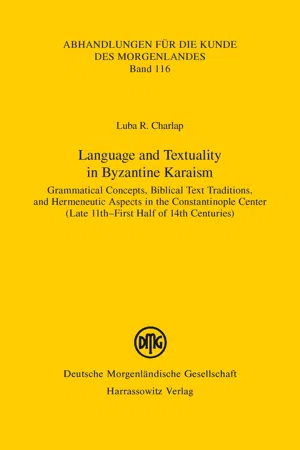
Language and Textuality in Byzantine Karaism
Grammatical Concepts, Biblical Text Traditions, and Hermeneutic Aspects in the Constantinople Center (Late 11th-First Half of 14th Centuries)
- English
- PDF
- Available on iOS & Android
Language and Textuality in Byzantine Karaism
Grammatical Concepts, Biblical Text Traditions, and Hermeneutic Aspects in the Constantinople Center (Late 11th-First Half of 14th Centuries)
About this book
This book is devoted to the medieval Byzantine Karaite contribution to Jewish creativeness and culture in the fields of Hebrew grammar and philological interpretation of the Bible. It is commonly agreed that Byzantine Karaism is vastly different from its older Karaite sister movement. In Byzantium, Karaism exchanged its Muslim environment and the characteristic discourse with which it was associated, and was required to redefine itself, vis-à-vis both the Jewish rabbinic majority and the broader sociocultural arena of Greek Christian host society. For the researchers of Karaite Judaism, its development under the influence of Christianity poses a complex challenge, one that has yet to be undertaken. The study focuses on three prominent Karaite scholars who were connected with Constantinople from the last decades of the 11th century until the end of the second decade of the 14th century. It examines the linguistic issues that arise in the writings of these scholars, exploring their roots in the early Karaite tradition, and comparing them with rabbinic conceptions that were prevalent during their time and even earlier. Clarification and analysis of topics related to the aforementioned subjects and terminology may serve as a window to comprehending the extent of the knowledge of the Hebrew scholarship and the unique perspective on it in the Constantinopolitan Karaite community, as well as may shed further light on the diachrony of Hebrew linguistic thought.
Frequently asked questions
- Essential is ideal for learners and professionals who enjoy exploring a wide range of subjects. Access the Essential Library with 800,000+ trusted titles and best-sellers across business, personal growth, and the humanities. Includes unlimited reading time and Standard Read Aloud voice.
- Complete: Perfect for advanced learners and researchers needing full, unrestricted access. Unlock 1.4M+ books across hundreds of subjects, including academic and specialized titles. The Complete Plan also includes advanced features like Premium Read Aloud and Research Assistant.
Please note we cannot support devices running on iOS 13 and Android 7 or earlier. Learn more about using the app.
Information
Table of contents
- Cover
- Title Page
- Copyright
- Table of Contents
- Body
- Preface and Acknowledgements
- Introduction
- Part I: The Commencement of the Period of Independent Creativity (Late 11th Century ‒ First Half of the 12th Century): Time o Transition
- Part II: The Period of Byzantine Independent Creativity at its Peak (Mid 13th ‒ 14th Centuries)
- Addendum: Selected Excerpts
- Bibliography
- Indices